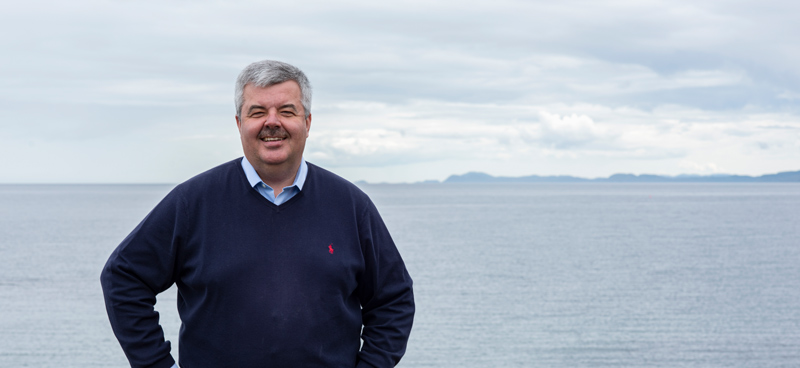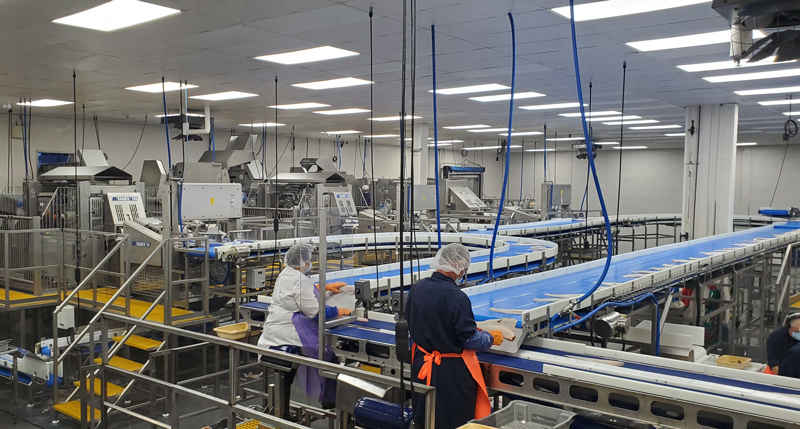Account Login
Don't have an account? Create One

Icewater Seafoods in Newfoundland and Labrador has been through a particularly turbulent year. There was an acute trial for the processing company when it ended shipments of cod from a Russian supplier in the wake of Russia’s invasion of Ukraine. The fish processor faced further challenges related to supply and labour. Regardless, according to president and CEO Alberto Wareham, the company has maintained quality production despite it all, and its customer base. A saving grace, he suggested, has been longstanding business relationships.
On February 24, 2022, Russian forces began a full-scale invasion of Ukraine. As the New York Times reported, tens of thousands of people have died to date, millions of people were forced to flee their homes, with infrastructure damage in the tens of billions of dollars.
A week before the invasion, Icewater Seafoods placed an order and then paid a deposit for a boatload of frozen-at-sea cod from Russia. On March 1, 2022, “given the unfolding tragedy” in Ukraine, the fish processing company announced it would be cancelling the shipment and no longer buying cod from Russia. “It was just doing what we thought was the right thing. We’ve always prided ourself here on being good corporate citizens (…) and that was just the right call at the time,” Wareham said, looking back at the decision that made headlines.
The supplier he was dealing with was one Icewater Seafoods had dealt with since 1997. Wareham said it was a solid relationship, the supplier was understanding and, significantly, returned the deposit already made for the shipment, “a significant amount of money.”
It turns out the call to cancel the shipment from Russia was the right one financially, independent of ethics or morals. On March 3, the Government of Canada removed both Russia and Belarus from entitlement to favoured nations’ treatment under the Customs Tariff. What it meant was they joined North Korea in seeing a general tariff of 35% applied on imports to Canada.
Wareham didn’t know about the tariff when he’d made his decision to cancel the shipment. The decision made, he was on to a new challenge, in finding a new source of raw product. He had some diversification in his supply and purchased from other suppliers in other countries before. In fact, a new relationship in Norway, started about a year earlier, had offered a small-scale supply for the plant in Arnold’s Cove. Wareham turned to that supplier for much more in 2022. With one call, about a week out from the canceled shipment, Wareham was on a plane to Norway. He’d ultimately switch about 80% of his need to the new supplier.
When it came to pricing, Wareham said the COVID-19 effect from restrictions and changes in purchasing in 2020 through to the fall of 2021 had dropped the price of raw material, of fish for processing. There has been some recovery before the invasion of Ukraine but, in the wake of the invasion, he said, paired with some quota changes outside of Russia, “we went up another 10-15% almost overnight.” He marked jumps in the cost within two months.

Looking closer to home, Icewater Seafoods was already managing a changing mix of supply for its cod processing. “In the last five years our supply of local raw material is down 70%,” he said, pointing at a collection of stock and business management decisions.
“If you go back five years, our business was basically 80% local fish and 20% frozen at sea. Now, this year, it’s likely going to be 30% local fish and 70% frozen at sea. So the importance is if we didn’t have access to frozen at sea raw material, we would not be able to supply our markets, and our people would have very little work here and we’d have a major problem in this business,” he said.
Pricing material from new sources, fluctuations in currencies and new, shorter-term supply contracts—it has all added to the stress in the daily business. On exchange rates, a single box of product can require the company to work in three or four different currencies. Wareham offered the example of fish bought in Norwegian kroner, sold to Icewater in U.S. dollars, imported to Canada with value converted to Canadian dollars, moved through the plant in Canadian dollars to result in value-added product, before sale in Euros or British pounds, into Europe or the United Kingdom.
Contracts for purchases of frozen-at-sea cod have shortened, he said, from what was six months to a year down to month-to-month, with record but relatively stable prices. The movement on currencies, though, requires constant and very clear check-ins with customers. “If they say it’s not ok (on cost and currency risk), we will not buy the fish,” Wareham said.
He said it’s not been easy explaining to customers of 25 and 30 years why they suddenly have to pay more in one month or another. “But with long-term relationships, you can get through having difficult conversations,” he said.
The war in Ukraine has had a knock-on effect in other areas of the fishery, with snow crab being an example. Newfoundland and Labrador MP Clifford Small felt the need to get vocal on Japan’s purchases of Russian snow crab this month (January). The Association of Seafood Producers in Newfoundland and Labrador chimed in on the negative effect for local producers, with chair Paul Grant roughly estimating on Jan. 19 that the undercutting of Canadian snow crab in the Japanese market could cost locals “well over $100 million,” when you include the ripple effect of the crab purchased from local fishermen last year being still in storage, losing value.
For Wareham, working in cod, there’s similar business uncertainty that can be tied back to the war. Cod is quite different though, he said. Crab is mainly sold into the United States and Japan. Cod’s reach is into different areas with arguably more opportunity, but the supply price and currency risk looms large.
“The (overall) risk in this business is the highest it’s ever been in its history. That’s the biggest, clearest statement I can make. The risk is extreme. It’s extreme,” he said.
The business continues though. And of note, the Icewater Seafood’s facility has seen improvements over the years to try to assure the ability to deliver the product desired once fish is secured and rolling in. A three-year, $13 million upgrade was finished at the Arnold’s Cove plant in June 2020 and included heading and filleting machines; machinery for X-raying (for bones), pin boning and portion filleting and a new ice management system.
Comment policy
Comments are moderated to ensure thoughtful and respectful conversations. First and last names will appear with each submission; anonymous comments and pseudonyms will not be permitted.
By submitting a comment, you accept that Atlantic Business Magazine has the right to reproduce and publish that comment in whole or in part, in any manner it chooses. Publication of a comment does not constitute endorsement of that comment. We reserve the right to close comments at any time.
Cancel